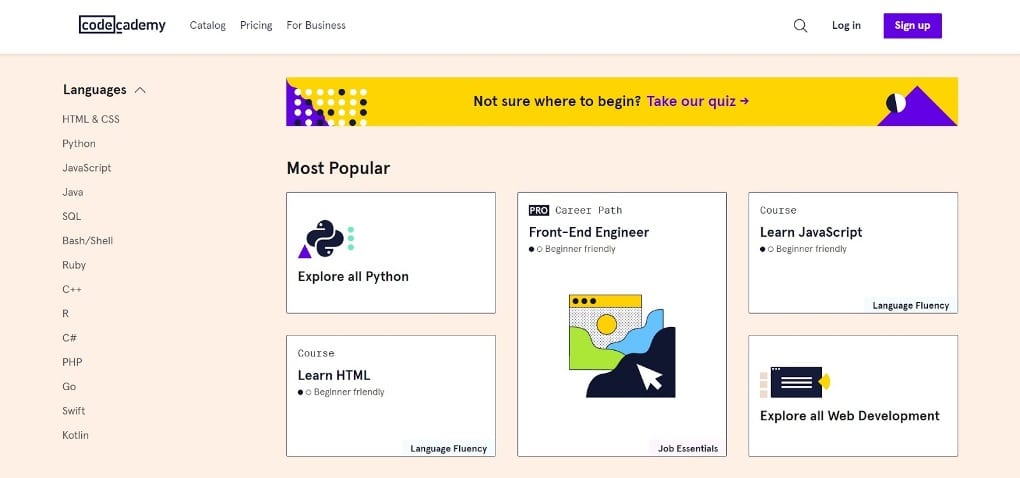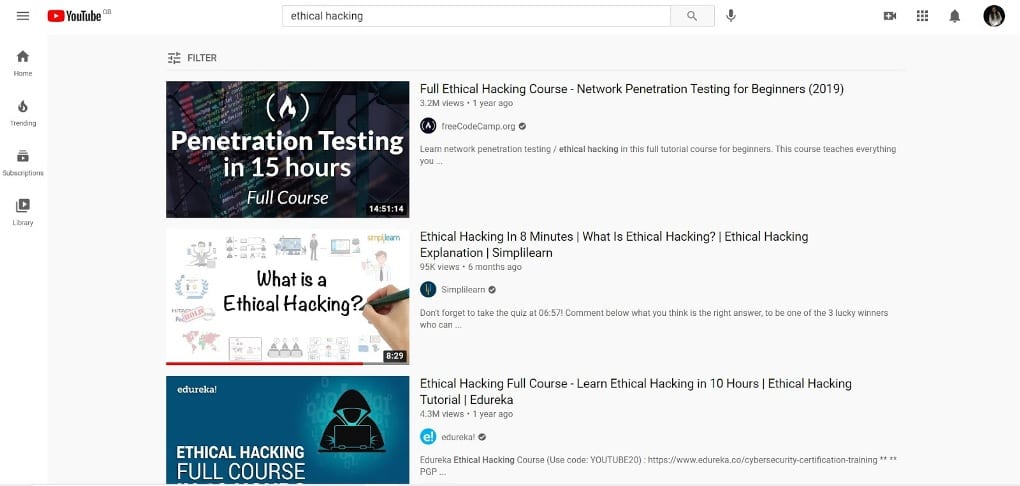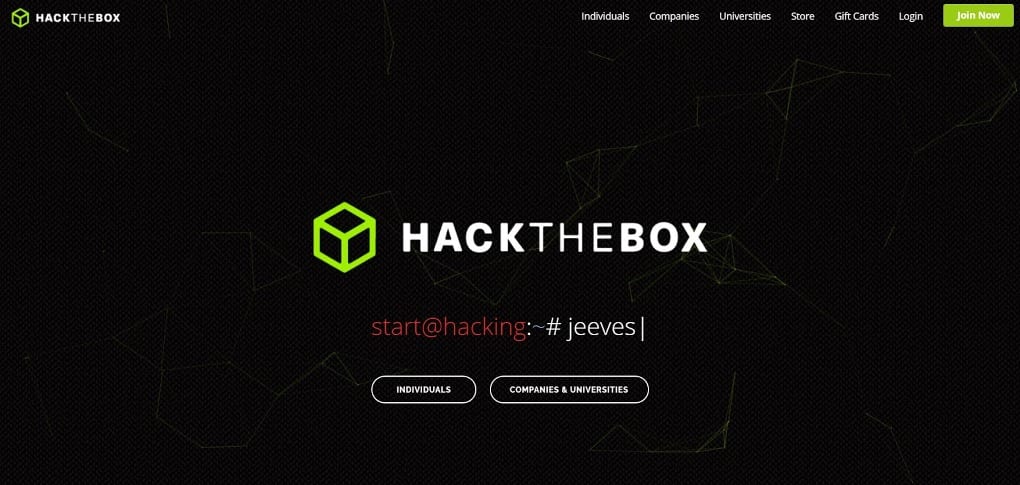Cyber security is a fast-growing field. Companies need security professionals to help protect against data breaches, a severe threat across industries. In 2021 alone, the losses hit an all-time high at $4.24 million, according to IBM. This, fortunately, can be mitigated if you learn ethical hacking skills.
Ethical hackers ensure that companies have impenetrable and secure systems. They use hacking tools to prepare against network vulnerabilities and powerful attacks. As more and more companies adopt better security solutions, learning ethical hacking can put you in a good place in terms of career prospects.
What Is Ethical Hacking?
If you’re wondering “what is ethical hacking?” know that it is a very valuable form of cyber security. It is also commonly known as white hat hacking. A certified ethical hacker helps companies discover the weak points in their system and resolve them so malicious hackers can’t use malware to steal money or information. Ethical hacking is entirely legal and usually well paid.
The Best Code to Learn for Ethical Hacking
Some of the best programming languages to learn for ethical hacking are HTML, PHP, Python, SQL, and JavaScript. Ethical hackers must have extensive knowledge of these programming languages to effectively protect against systems threats.
You will need also to know about networking, databases, and operating systems like Windows, Mac, and Linux. You will need to think like a hacker while learning about web and systems hacking before you can begin a career in information security.
Also, note that you will need to pass a polygraph test if you interview for an ethical hacking job in the government to prove that you have not committed any crimes.
What Is Ethical Hacking Used For?
Before discussing the possible uses of ethical hacking, let’s look at the effect a non-ethical hacker can have on a company. If an organization does not have a cyber security plan to defend against malware and cyberattacks, a malicious hacker can enter the system and do one of three things:
- Unauthorized modification: A malicious hacker can modify systems, allowing them to steal information, cause devices to crash, disrupt services and apps, and stop essential software updates.
- Unauthorized deletion: A malicious hacker can remove data files that could be of great importance.
- Unauthorized access: A malicious hacker can gain access to unauthorized data and acquire valuable information that can be sold illegally.
Now that we know what a hacker does, we can better understand what an ethical hacker does. An ethical hacker is hired to stop other hackers from accessing a company’s private data. The process behind ethical hacking is:
- Identify malware or threat
- Analyze and evaluate
- Solve the issue
Types of Hacking
There are several types of ethical hacking and non-ethical hacking. Generally, we use different colors to describe the morality of their work. Below are the three main types of hackers and what they each do.
White Hat Hackers
White hats are ethical hackers. They do not have any malicious intent. Instead, they aim to root out the weaknesses in a computer system or network. When you learn white hat hacking skills, you can explore roles such as security analysts, penetration testers, and security engineers.
Black Hat Hackers
Black hat hackers are generally defined as cyber criminals with malicious intent. There is no such thing as black hat ethical hacking. They aim to steal corporate data, violate privacy regulations, damage computer systems, and block network communication either for personal gain or out of malice.
Gray Hat Hackers
As the color suggests, these hackers are in a moral gray area. People doing gray hat ethical hacking may engage in a mixture of the activities described in the two categories above. For example, they may highlight security weaknesses within a system and contact the owners to demand payment for having highlighted a flaw in their security systems.
There are also several subcategories of hackers such as hacktivists. A hacktivist will compromise a system to draw attention to a social, religious, ideological, or political message.
Ethical Hacking Career Outlook
An ethical hacking career has a positive outlook. The Bureau of Labor Statistics projects a 33 percent growth in cyber security jobs between 2020 and 2030. That is significantly higher than the eight-percent average of all jobs across industries in the US. Security professionals also earn an average of $102,600 per year, making it one of the highest-paying jobs in tech.
An ethical hacker career path begins with skills building which can be achieved through a four-year computer science program or a career-focused cyber security bootcamp. You can then move on to entry-level positions such as security analysts, security software developers, or security administrators.
As you gain more experience with the practical applications of ethical hacking concepts, security vulnerabilities, and network hacking, you can apply for a Certified Ethical Hacker (CEH) certification by the EC-Council. This further demonstrates your cyber security proficiency and boosts your resume. CEH holders can earn up to $100,000 on average.
Where to Learn Ethical Hacking

This section will provide more information on where to learn ethical hacking. There are two main avenues to becoming an ethical hacker. First, there is the traditional route of getting a bachelor’s degree in information technology from a four-year university. A degree in computer engineering or computer science would also allow you to pursue this career.
The other route is to take online ethical hacking courses and obtain other certifications relevant to ethical hacking. You can attend a coding bootcamp or online course to learn the programming languages used in hacking. This can be a more challenging route, but it is also much cheaper than college.
Ethical Hacking: How Long Does It Take to Learn?
How long it takes to learn hacking depends on the individual and their ability to learn programming and other related skills. It can take anywhere between 18 months to six years to fully develop your ethical hacking skills.
If you are starting with no relevant hacking or coding skills, it will likely take you longer. However, if you already know how to code, you can complete the CEH online training and test in as little as five days. The four-hour exam will assess your proficiency in cloud and IoT, malware analysis, and modern exploit technologies.
How to Learn Ethical Hacking: Step-by-Step
This step-by-step guide will show you how to learn ethical hacking skills. The process, however, may look different to different people depending on your background and existing skillsets. Beginners can benefit from this guide as we explain some of the best ways to learn ethical hacking in 10 simple steps.
Step 1: Kali Linux
The first step is to learn Linux programming, commands, and scripting. Employers prefer Kali Linux, and there are plenty of great courses you can take to learn Linux properly. See the best ethical hacking courses below for details.
Step 2: Other Programming Languages
To fully learn ethical hacking, it is also essential to learn other coding languages. These include HTML, Javascript, Python, C++, and PHP, among others. In-depth knowledge of programming languages will help prepare you to acquire the necessary certifications and to effectively defend against malicious hackers in your job.
Step 3: Security Fundamentals
Learning ethical hacking will not be complete without a deep understanding of security fundamentals. You must be able to understand the components of a secure system, essential protocols and procedures, and security solutions to defend the network from all types of attacks.
Step 4: Learn How to Leave No Trace
Learning ethical hacking also involves being good at keeping anonymity. When doing penetration testing, for example, you must know how to bypass firewalls because they are designed to deter unauthorized actions. You can keep your systems safe by being anonymous since it can be hard to tell who else is in the same network.
Step 5: Get Familiar With Cryptography
Cryptography is crucial to building a solid security system. To achieve secure communication, you can use cryptography to protect, maintain, and authenticate data. As such, cryptography knowledge is very useful for people looking to find a job in cyber security.
Step 6: Network
Networking is vital in cyber security and IT in general, as everything runs on a network. Learning how to navigate and protect a network is critical background knowledge for hacking.

"Career Karma entered my life when I needed it most and quickly helped me match with a bootcamp. Two months after graduating, I found my dream job that aligned with my values and goals in life!"
Venus, Software Engineer at Rockbot
Step 7: Ethical Hacking Certification
The next step is to take the CEH course and exam. This is the entry-level certification for an ethical hacker. You can also complete a penetration tester course like CompTIA Pentest+ to gain a similar accreditation.
Step 8: Offensive Security Certified Professional
This is a more high-level certification for advanced students that involves a grueling exam. The Offensive Security Certified Professional (OSCP) exam takes 24 hours without breaks, but the certification is highly regarded. You can also opt for the premium option, which gives you access to the lab, online courses, and unlimited exam attempts.
Step 9: Work in Information Security
Technically, you can choose to do this step earlier while you study. Just remember that gaining work experience is a crucial way to test your knowledge and use your problem-solving skills.
Step 10: Attend Events and Meet Hackers
You can learn more about ethical hacking through industry events such as seminars, gatherings, or meetups. Not only do you get the opportunity to build professional connections, but you also get to learn ethical hacking from various perspectives and expand your cyber security knowledge.
How to Gain Experience as an Ethical Hacker
If you’re wondering how to practice ethical hacking, this section offers three suggestions that can help you reinforce your skills and get better at understanding the attack surface. Let’s look at each of the options below.
Participate in Penetration Testing Exercises
There are several vulnerable websites that novice ethical hackers can use to practice penetration testing. They include HackThisSite, Google Gruyere, and Hellbound Hackers. Some of these websites are specifically designed to help you improve and practice ethical hacking skills. You can also participate in similar penetration testing exercises online.
Offer Your Service as a Freelancer
A freelance career is a viable option for ethical hackers. While some prefer being a part of a larger security team, others may enjoy working on their own. This affords them the flexibility to work on projects that they directly choose. You can test the waters for market demand and put your skills to the test by offering your services on platforms like Fiverr and Guru.
Sign up for Hands-on Courses or Job-focused Programs
There are a lot of ways you can gain experience as a beginner ethical hacker. One of the best ways is to enroll in a cyber security program that incorporates projects, practical exercises, and hackathons. Some projects can also be included in your portfolio in place of experience as they demonstrate successful ethical hacking.
The Best Ethical Hacking Courses and Training

There are many ways to learn ethical hacking including in-person classes, online courses, and free courses. Browse our list below to discover the best ethical hacking courses for beginner, intermediate, and advanced students.
In-Person Ethical Hacking Classes
Below are a few in-person ethical hacker classes that students may want to pursue. Due to the pandemic, fewer courses are offering this type of learning experience. However, there are still a few options for those of you who prefer classroom education.
General Assembly
- Courses: Ethical Hacking with Hackerone in Dallas | Online Python Course | Online JavaScript Course | HTML, CSS, and Web Design Circuit
- Location: Varies
- Prerequisites: Varies
- Price: Varies
General Assembly provides many immersive full-time and part-time programs in many tech skills ,including hacking classes for beginners. Students can learn individual programming languages online or can attend a special course for ethical hacking in Dallas, Texas.
American University
- Courses: Cybersecurity Professional Certificate: Ethical Hacking Program
- Location: Washington, DC
- Prerequisites: Introductory course and intermediate programming knowledge
- Price: $13,000
American University’s ethical hacking program takes place in Washington, DC and includes hands-on exercises and immersive cyber labs. These activities will prepare students for the CEH and OSCP exams.
TrainACE – Academy of Computer Education
- CEH – Certified Ethical Hacker Training and Certification
- Location: Greenbelt, MD
- Prerequisites: Knowledge of programming, security, and networking fundamentals
- Price: $2,995
This five-day CEH training course teaches information technology professionals the fundamentals of ethical hacking. Students will learn about information security threats and attack vectors, hacking concepts, information security controls, penetration testing concepts, and information security laws.
Online Ethical Hacking Courses
Ethical hacking online courses are currently the most popular route to becoming an ethical hacker. This option is a preferred choice by many because all lessons can be done remotely, saving them energy, time, and money. Below are some great online study options to learn ethical hacking.
EC – Council
- Courses: CEH – The Ultimate Ethical Hacking Course | CEH Master | Certified Network Defender | The Licenced Pentester (Master) Certification Program | Certified Threat Intelligence Analyst (C|TIA)
- Prerequisites: None
- Price: Varies
The EC Council offers brilliant professional online training for most cyber security career paths. Students interested in an online ethical hacking course can choose from among its CEH courses to become certified professionals.
CompTIA
- CompTIA Linux+ | CompTIA Security+ | CompTIA Network+ | CompTIA PenTest+
- Time: Varies
- Prerequisites: Vary
- Price: $226 – $899
Beginners who want to become ethical hackers should start with these courses. Students should take classes in Linux, security, and network before attempting the PenTest course. These professional certificates are the perfect first step to getting into ethical hacking.
Free Ethical Hacking Courses
Below are a few free ethical hacking courses if you want to try out ethical hacking or gain some background knowledge without having to make any investment. These are great for beginners and intermediate-level hackers.
LinkedIn Learning
- Become an Ethical Hacker
- Prerequisites: Vary
- Price: First month free
This 27-hour LinkedIn course is free for the first month, which is plenty of time to complete this introductory course. You will have access to free ethical hacking tutorials. It comes with a certificate of completion to help boost your resume.
Coursera
- Hacking and Patching
- Prerequisites: None
- Price: Free
In this 14-hour Coursera class, students will learn how to hack web apps with command injection vulnerabilities. Students will also learn Linux systems with LAMP services and how to deposit and hide Trojans.
Skillshare
- Vulnerability
- Prerequisites: None
- Price: Free
Students can explore vulnerabilities, exploits, payloads, and Metasploit History in this quick, 13-minute Skillshare video tutorial.
Ethical Hacking Certification
An ethical hacking certification is a great way to demonstrate your skills to potential employers. They are typically designed to simulate the uncontrolled live environment that you may face in the workplace. The cost of an ethical hacker certification varies depending on the intensity of the certification program and your skill level.
CompTIA PenTest+
This ethical hacker certification by CompTIA+ is suitable for experienced cyber security professionals. It is set to test your understanding of vulnerability management through a series of performance and knowledge-based questions. You have to answer 85 questions in 165 minutes. The certification exam costs $381.
GIAC Penetration Tester (GPEN)
This ethical hacker certification is offered by Global Information Assurance Certification. It is recommended to professionals involved in risk assessment and mitigation and penetration testing. You are required to answer 82 questions in three hours. The certification exam costs $2,499.
Certified Ethical Hacker (CEH)
CEH is a well-known certification as it evaluates your knowledge in cloud computing, hacking challenges, and malware reverse engineering, among others. To be eligible for this certification exam, you need to show proof of at least two years of industry experience. You are given four hours to complete 125 questions and the examination voucher costs $1,199.
Ethical Hacking Books
Another way to build your hacking knowledge is with books, e-books, and audiobooks. These are a great way to flesh out your studies. Below are Career Karma’s top ethical hacking book picks.
Web Application Hacker’s Handbook – Finding & Exploiting Security Flaws, Dafydd Stuttard
This book discusses current step-by-step techniques for attacking and defending the range of ever-evolving web applications. Learn all about frameworks, HTML5, cross-domain integration techniques, UI redress, frame busting, HTTP parameter pollution, and hybrid file attacks.
Computer Programming & Cyber Security for Beginners, Zach Codings
This is a guide to Python programming for machine learning and deep learning. Students will learn about data analysis, algorithms, data science with Scikit Learn, web hacking, Kali Linux, and the role of an ethical hacker. This makes it one of the best beginner hacking books.
The Hacker Playbook 2 – A Practical Guide To Penetration Testing, Peter Kim
This book, the second in a series of three, is an easy-to-read guide that explores many of the roadblocks people face during penetration testing. These include attacking different networks, pivoting through security controls, privilege escalation, and evading antivirus software.
Advanced PenetrAdvanced Penetration Testing: Hacking the World’s Most Secure Networks, Wil Allsopp
This book teaches essential techniques that provide a detailed picture of a system’s defense. Custom coding examples use VBA, Windows Scripting Host, C, Java, JavaScript, and Flash.
Online Ethical Hacking Resources
The Internet is a valuable learning tool and it can provide a slew of ethical hacking resources if you know where to look. Here are some websites that will teach you new skills and allow you to practice penetration testing.
Codecademy.com

Learn how to code, become a full-stack developer, and more with these free courses and video tutorials.
Youtube.com

Is there anything that YouTube content creators have not made more accessible and fun to learn? Check out the experiences of professional, ethical hackers, or watch hacking tutorials for free.
Hackthebox.eu

Hack The Box is an online platform that allows you to try out your penetration testing skills and exchange ideas with thousands of others in the security field. To try it out, log onto the website and get started on one of their live machines.
Should You Study Ethical Hacking?

Now, you may be wondering, “Should I learn ethical hacking?” and the answer is yes, you should if you want to land a job in a thriving field like cyber security. With ethical hacking skills, you can explore various high-paying roles such as information security analysts, penetration testers, and security consultants.
Ethical hacking jobs are also great if you are fascinated by evolving technology, interested in protecting organizations from hackers, and looking for consistent learning opportunities. We hope this article has prepared you to go out there and get your foot in the door as an ethical hacker.
Learn Ethical Hacking FAQ
Yes, hacking for beginners is highly possible. The common misconception is that cyber security skills are difficult, such that they can only be mastered by people with existing degrees. There are a lot of online and in-person programs you can take that are suitable for novice ethical hackers.
Is ethical hacking legal?
Yes, ethical hacking is legal. The word ‘hacking’ may have a negative connotation, but quick research would show you that there are many types of hacking that you can perform. White hat hacking, for example, is meant to assess the risks of a potential breach or malicious attack and is typically performed by an organization’s own security team.
Is ethical hacking hard?
Ethical hacking is not hard if you have the right skills. Today, it’s easier than ever to access proper cyber security training that suits your budget, skill level, and desired job outcomes. You can find introductory courses at almost every university or bootcamp that offers cyber security programs. These can help you build fundamental knowledge and get up to speed.
What are the essential skills to becoming a master hacker?
Some of the most essential ethical hacking skills include proficiency in several programming languages. A lot of industry professionals recommend C, HTML, JavaScript, Python, C++, and PHP. Other ethical hacking core skills include the understanding of risk analysis and mitigation, security vulnerabilities, and secure systems.
About us: Career Karma is a platform designed to help job seekers find, research, and connect with job training programs to advance their careers. Learn about the CK publication.



